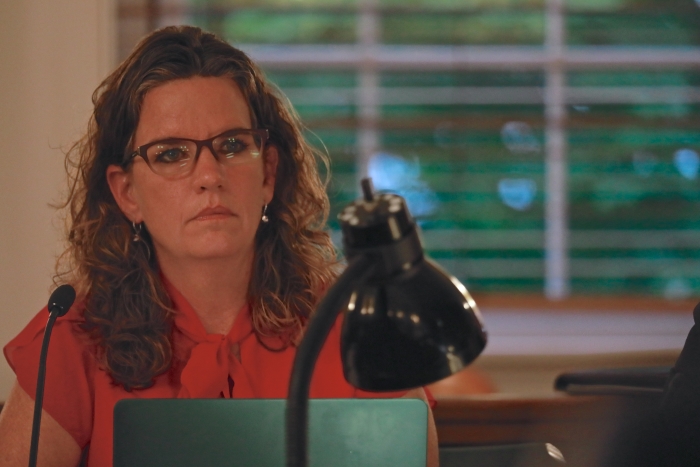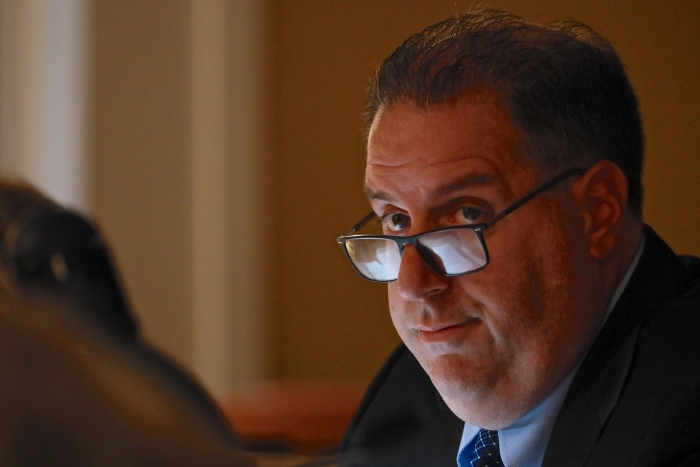Philipstown legislator is sole opposition
The Putnam County Legislature voted 7-1 on Tuesday (July 2) to adopt a law that allows legislators, county officials and even consultants to classify documents as “confidential” to prevent their disclosure.
Legislator Nancy Montgomery (D-Philipstown) cast the sole “no” vote on the measure, which amends a section of the county ethics code and makes anyone who intentionally breaches confidentiality subject to an ethics inquiry and possible prosecution. Montgomery argued the proposal should have been discussed further before a vote.
The law now goes to County Executive MaryEllen Odell, who must conduct a public hearing before signing or vetoing it.
Before the vote, Montgomery proposed that the resolution be sent back to the Rules Committee. “Where did it come from?” she said. “Who initiated it? It was a surprise” when it appeared on the agenda for the June 20 committee meeting.
“I’m surprised you’re surprised,” responded Legislator Neal Sullivan (R-Carmel), who chairs the committee. “We all knew about it. There had been problems for years with people disclosing information that should not be disclosed.” He noted that the topic had been on the Rules Committee agenda in April but was postponed. (In the minutes from that meeting, the item is titled “Discussion / Confidentiality of Attorney-Client Communications.”)
Montgomery replied that talking about “confidentiality” and unveiling a specific law are separate actions and noted citizens’ concerns about the latter.
If Odell signs the measure, allowing it to take effect, it will authorize “any county officer or employee, outside legal counsel or consultants” to make a document confidential. In addition, communications by, to, or from the county Law Department, the Legislature’s attorney, or outside legal counsel or consultants “shall be presumed to be confidential material even if not explicitly designated ‘confidential.’ ” (The Legislature could vote to release documents, but only if every member present agreed. Unanimous votes are not usually required for legislative approvals.)
In addition, documents marked “confidential” could only be shared with local, state and federal agencies with the approval of the county attorney.
While records deemed secret can be obtained through the state Freedom of Information Law, the resolution states that anything marked “confidential” is “typically exempt from disclosure.”
After being sent a copy of the proposed law by The Current on June 21, Robert Freeman, then-executive director of the state’s Open Government Committee, which issues advisory rulings on the state FOIL and the Open Meetings Act, called it “ridiculous.”
More recently, Kristin O’Neill, the assistant director of the committee, said her office had “significant concerns with any local law that gives employees and officials the authority to determine whether a record is confidential. A record is only ‘confidential’ when a state or federal statute makes it so.
“While an agency has the ability to withhold records or portions thereof under limited circumstances, that does not make the records ‘confidential,’ ” she noted. “The language of this proposal may lead to confusion about what should be public and what can be withheld and may also lead to improper denials of access” by the public records officer in response to FOIL requests.
The Putnam legislators who support the law say it is essential for preventing disclosure of such items as medical records, law enforcement information that could endanger an officer’s life or expose investigative tools (such as an undercover car), credit histories, Social Security numbers, staff email addresses that might be exploited commercially, pistol license applications and tax records.
The FOIL protects from disclosure sensitive law enforcement information, data whose release would “constitute an unwarranted invasion of personal privacy,” trade secrets, anything that could interfere with judicial proceedings, details of union negotiations or imminent contract awards, and similar material.
“This is not about secrecy,” said Legislator Paul Jonke (R-Southeast) before the vote. “Information available via the Freedom of Information Law is and will always be available to the public. This is not changing.”
“There’s nothing secretive about this,” agreed Legislator Ginny Nacerino (R-Patterson). “This does not change anything.”
According to legislative Chairman Joseph Castellano (R-Brewster), the law “clarified exactly how to handle confidential material. Certainly, members of the public can FOIL anything they like.”
In response to an earlier question from The Current about how a county employee or legislator would determine what material should be marked confidential, Castellano had said they would rely on “law, rule, policy, procedure” or “the exercise of sound judgment.”
The resolution appears to conflict with years-old legal rulings that prohibit local entities in New York from passing laws that make entire swaths of documents secret by default, Freeman said. He cited an opinion he wrote 14 years ago after Monroe County officials requested guidance on which materials they could keep confidential. Freeman wrote, citing decisions by the state’s highest court, the Court of Appeals, that “a local enactment, such as a county code, local law, charter or ordinance … cannot confer, require or promise confidentiality” and so, if passed, would be “all but meaningless.”
The Freedom of Information Law, which journalists and residents rely on to understand decisions by public officials and how taxpayer money is spent, presumes every government document is public unless a legislature or agency can provide what the Court of Appeals has called “particularized and specific justification” to keep it secret using the exceptions outlined in the FOIL.

Several county residents spoke against the proposed law at the July 2 meeting.
Julia Famularo of Philipstown expressed worries that the law “may have a chilling effect on whistleblowers.” Heidi Wendel, a Nelsonville resident who is the former chief of the civil frauds division of the U.S. Attorney’s Office for the Southern District of New York, suggested in a letter to The Current that the law may, in fact, conflict with whistleblower protection laws.
Conner Brennan, of Cold Spring, said that with the law’s provisions, “you are inviting tyranny into Putnam County. This is not what democracy looks like.”
“What are you afraid of?” asked Kathleen Foley, another Cold Spring resident. She said the proposed law “is arbitrary, capricious and unlawful and, dollars to doughnuts, will not stand” if challenged. The law’s proponents seem unaware that the FOIL already exempts sensitive material from disclosure, she said, and have “shown ignorance of those laws in a most spectacular way.”
Rebecca Swan, a Carmel resident and Democratic candidate for the Legislature, termed the vote “shameful. If there’s no change,” as legislators maintain, “why amend your ethics code? There is no reason for this other than to hide waste, mismanagement and possible corruption.”
Reinvent Albany, a nonprofit that advocates “open, accountable New York government,” predicted on Twitter that the county would lose any court challenge to the law and noted that, under the FOIL, “attorney fees will be awarded to whomever sues. Putnam will waste Putnam taxpayer money and court time for what? This is foolishness by Putnam.”
Montgomery thanked those who either wrote the Legislature or came to Tuesday’s meeting to share their views. “It’s your comments that keep us practicing good public government,” she said.

Legislators may like this idea. But in New York, it’s against the law:
https://www.dos.ny.gov/coog/openmeetlaw.html
In relevant part: “§100. Legislative declaration. It is essential to the maintenance of a democratic society that the public business be performed in an open and public manner and that the citizens of this state be fully aware of and able to observe the performance of public officials and attend and listen to the deliberations and decisions that go into the making of public policy. The people must be able to remain informed if they are to retain control over those who are their public servants.”
As for “confidential” stuff, §108 covers “Exemptions”. The Open Meetings Law doesn’t apply to political committees or courtrooms. It DOES apply to ALL meetings of a public service commission and a zoning board.
Crucially, the Open Meetings Law allows nondisclosure of documents or proceedings which MUST be kept confidential by STATE or FEDERAL law. A dinky little local gov’t has no — ZERO — authority to decide what’s confidential that can’t be disclosed.
This kind of sneaky activity by politicians belongs in Moscow. These Putnam politicians should move to Russia. They don’t belong here.
Something must have happened to stampede seven of eight Putman legislators into voting for a proposal that seems likely to be reversed by the courts. Did someone release “medical records, law enforcement information…, credit histories, Social Security numbers, staff email addresses…, pistol license applications [or] tax records” that the article cite as reasons for the new rules? I’m guessing, instead, that someone leaked something that embarrassed or inconvenienced one of the elected officials, and this is an elaborate attempt to keep it from happening again. A well drafted FOIL request might get to the bottom of it!
Putnam already has out of control secrecy. If anything it needs transparency. This county gets away with secrecy that no other county can. It needs to stop! I am a resident of Putnam and strongly oppose this law! It will further enhance hiding corruption which in my opinion is its sole purpose!
As Legislator Sullivan commented, this law has been a long time in coming. Indeed, it has under various guises as legislators requested financials expended for Tilly Foster and the Putnam Golf Course and were stonewalled; as legislators and the public during the Butterfield episode attempted to obtain documents and couldn’t; as executive sessions were called under dubious circumstances and even previous to this there was the attempt by the CE to enact IT monitoring. This law is not only suspicious but dangerous and should be litigated.
So this isn’t actually a law yet, but a resolution passed by the legislature. In a completely backward process, the County Charter only requires public comment after the legislature has voted —- see Section 3.04-B (Executive action on local laws). Here’s the notice:
“Public Hearing for the Local Law to amend the Putnam County Code Entitled Ethics, Code of, and Financial Disclosure to Prohibit the Disclosure of Confidential Material is scheduled for July 24th at 3:30 pm & again at 6:30 pm in the County Executive’s Conference room.”
That’s on the third floor of the county office building, 40 Gleneida Ave., for those who don’t know — apparently that bit of information didn’t seem worth sharing.
When the Putnam County Executive holds a public hearing, she does it in the conference room of her office, not in a public meeting room, and at times inconvenient for most folks to attend. It is unclear whether Odell will make a presentation at the listed times, or just sit at the table and see if anyone shows up. No end time for these “office hours” is provided. Shocking, I know.
Please either attend or submit written comment to MaryEllen Odell ([email protected]) in advance of 7/24. I think it would be great for the folks who raised the excellent questions above to ask them of the executive directly.
I find it rather disturbing that the Putnam County Legislature has passed a “secrecy law,” as if those people were actually discussing matters of national security, instead of representing the folks who live in Putnam County and have happened to elect these bozos to do our business.
The Russian playbook to dismantle each and every component of our government has arrived way too soon to our backwoods area, which suggests that the Republican playbook has been passed on quite thoroughly and is in an advanced stage of killing whatever democracy we once were proud of.
Do these legislators think we are that stupid that we cannot see what they are up to? Should not all their deliberations and conversations be available to the general public, or are we in a shut-down form of governmental rule? It is time for folks to wake up, or otherwise we can forget the supposed freedoms that once were the foundation of our nation.
So much for transparency. This county’s government is a joke.
Good article. Bad legislature.
What are they planning to hide?